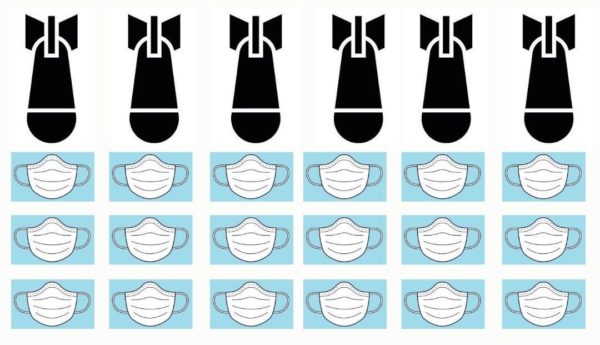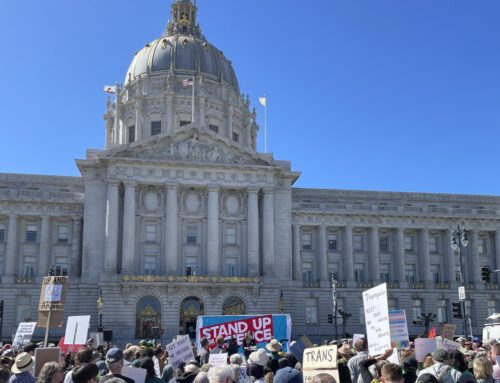
APRIL 29, 2021
POLICY WATCH, ACTIONS, EVENTS, PSR MEMBERS NEWS, READINGS & RESOURCES, AND MORE
SF Bay PSR goes beyond policy advocacy with a diverse array of projects designed to nurture a paradigm shift in the way we as a society approach the environment, health, and security. However, policy advocacy is at the heart of our work. This past month, we have been in a whirlwind of national and California policymaking efforts. Because policy proposals have been moving so fast, we decided to build upon our March newsletter by giving some policy updates here. We will fill you in with more in-depth analysis when the dust settles, and we’ve had time to research and reflect. If you missed our March Newsletter: 2021 Policy Focus, you can catch up here.
 POLICY WATCH
POLICY WATCH
The following California bills would work in concert to address both public health and health equity, as well as the climate crisis, by reducing GHG emissions while initiating a just transition for workers to a green economy. Further down you will find our anti-nuclear policy section.
Governor Newsom ordered a ban on new oil fracking by 2024.
If enacted, it would accomplish the mission years sooner than the original SB 467. However, Sierra Club says it is not enough. READ MORE
SF Bay PSR SUPPORTED SB 467: This bill would have banned fracking and created set backs from oil wells to protect communities nearby. But it did not advance through the committee process. We are grateful to VISION-CA for their community-led leadership on this bill and remain committed to passing legislation that will create setbacks from oil wells and protect the communities living near them. READ MORE in Sierra Club Magazine: Letter from Sacramento: When Will the California Legislature Meet the Moment? READ MORE about SB 467 in our MARCH Newsletter.
SUPPORTED SB 582 the Climate Emergency Mitigation, Climate Safe Restoration, and Just Resilience Act of 2021: Signed the Climate Center’s organizational sign on letter in support of SB 582, a bill which strengthens state climate policy by increasing greenhouse gas (GHG) emission reduction targets from 40% below 1990 levels by 2030 to a higher threshold for 2030 and beyond.
Senator Eggman, on Tuesday, April 27, voted YES in the Natural Resources & Water committee on SB 582. Though we are grateful to Eggman, we still need her and her colleagues to support passage of legislation, such as SB 467, to explicitly create setbacks from oil wells and protect communities living nearby. Again, thank you to VISION-CA for their leadership on these efforts.
SB 582 is a bold bill that would do five things:
1. Set a new goal for CA to reduce GHG emissions by 80% by 2030 (current goal is 40%— IPCC goal is 50%, Biden just set a goal of 50% by 2030 last week for the whole US)
2. Set a goal for CA to become net carbon negative by 2035
3. CA would become active again in international climate action efforts as this is a global problem and needs global solutions (Jerry Brown did a lot of work internationally, Newsom has not)
4. Develop a climate resilience plan especially for vulnerable communities
5. Develop a plan for climate restoration
SUPPORTED: SB 30s decarbonization package: There are no hearing dates yet for these bill proposals. SB 32 was sent to Senate Governance and Finance on April 15. SB 31 went to Senate Energy, Utilities and Communications on April 19.
The California Air Resources Board reports that the building sector is the second largest source of greenhouse gas (GHG) emissions in the state, second only to transportation. SF Bay PSR is supporting a set of bills (California Building Decarbonization Package – SB 30, SB 31, SB 32) that was introduced to decarbonize buildings. READ MORE in our MARCH Newsletter.
SUPPORTED AB 1346: San Francisco Bay Physicians for Social Responsibility calls for a ban on the use of combustion-powered landscape equipment in CA by January 2024. The bill is being heard in committee this week. Bravo to David Bezanson, SF Bay PSR Environmental Health committee member for his efforts on this bill.
SUPPORTED methane regulation petition to the EPA: Signed the Climate Law Institute, Center for Biological Diversity petition to EPA to regulate methane and ethane as volatile organic compounds under the Clean Air Act. If successful, this petition will meaningfully cut methane and ethane emissions from the fossil fuel industry, which are precursors to smog. In turn, it would protect communities from asthma, which afflicts 1 in 13 Americans and is the most frequent chronic illness in children.
SUPPORTED: Signed organizational letter in support of the Orphan Wells Cleanup and Jobs Act of 2021, introduced by Representative Leger Fernandez. This legislation will create jobs through a new program for the plugging, remediation, and inventory of orphaned wells on federal, tribal, state, and private lands by strengthening federal oil and gas bonding requirements and creating incentives for states to strengthen bonding rules and other protections.
SUPPORTED AB 125: Californians for Pesticide Reform’s organizational sign on letter in support of AB 125, which proposes placing a $3 billion bond on the 2022 ballot to fund economic recovery, greater equity, and climate resilience investments in our food and agriculture sectors.
SUPPORTED AB 1371: Oceana’s organizational sign on letter in support of AB 1371, a bill introduced by Assemblymember Friedman, which will help address the global plastics crisis by phasing out the unnecessary and unacceptable amount of single-use plastic used to ship online purchases in and into California.
SUPPORTED AB 30: Audubon California’s organizational sign on letter in support of AB 30, which would declare it a policy of the state that access to nature and its benefits is a human right.
SUPPORTED AB 652: Environmental Working Group’s organizational sign on letter in support of AB 652, which would reduce a source of PFAS contamination in our children by prohibiting its use in a range of juvenile products.
SUPPORTED AB 1200: Sponsored by Assemblymember Ting, the bill would prohibit PFAS toxic chemicals in paper-based food packaging, require disclosure of toxic chemicals in cookware, and stop manufacturers of cookware from making misleading marketing claims.
SIGNED: Budget proposal authored by California Can’t Wait Coalition which would dedicate $200 million annually to local public health departments to begin rebuilding workforce and infrastructure before the next public health crisis and make strides toward health equity.
SIGNED: Campaign for Fossil Free Buildings in Silicon Valley’s letter in support of an all-electric reach code for healthy homes, clean air, and a climate resilient community in Belmont.
Special thanks to SF Bay PSR intern, Daisy Valdivieso, for her research and editorial assistance with the policy and committee sections of this newsletter.

Anti-Nuclear Policy Efforts
SF Bay PSR is working closely with the PSR National office on efforts in three main areas related to nuclear weapons abolition goals envisioned in our Back from the Brink (BftB) campaign. First, we are supporting legislation that would divert wasteful military spending, particularly on nuclear modernization efforts, to address graver threats to our country illustrated by our COVID pandemic. We are supporting national legislation advocating for limits on sole Presidential authority to launch a nuclear attack, and for our government to declare a policy of no-first-use of nuclear weapons. Finally, we are encouraging the Biden Administration’s return to diplomacy after the destructive “America First” policies of the Trump Administration.
Investing in Cures Before Missiles Act (ICBM) (Senate: S.982. House: H.R.2227)
Representative Ro Khanna and Senator Ed Markey are working together to introduce this new ICBM Act, which aligns with our Back from the Brink campaign’s call to “cancel enhanced nuclear weapons.” The legislation would essentially redirect funds from destabilizing new weapons systems (such as the Ground Based Strategic Deterrent [GBSD] replacement for aging Minuteman III ICBMs and new W87-1 warhead) toward conducting research for the development of a universal coronavirus vaccine, and methods to combat emerging and zoonotic infectious diseases that pose the potential for future pandemics.
ACTION
Alongside Ro Khanna, CA Representatives Barbara Lee and Jared Huffman are co-sponsors. If one of them is your representative, please thank them. Otherwise, please call and/or write your member of Congress and ask them to co-sponsor the bill. Additional co-sponsors of H.R.2227 to date are Reps. James McGovern, Mark Pocan, Pramila Jayapal, Earl Blumenauer, Steve Cohen, Raul Grijalva, Jesus Garcia, Sheila Jackson Lee, Ayanna Pressley, Ilhan Omar, and Delegate Eleanor Holmes Norton. More information at www.congress.gov
RESOURCES
One-page ICBM Act factsheet from Represenative Ro Khanna and Senator Ed Markey. Thank you Tri-Valley Cares!
Text of the ICBM Act. The text is the same for S.982 and H.R.2227.
Cutting Pentagon Spending
In March, Representatives Barbara Lee, Marc Pocan, and Jacob Auchincloss sent a letter from Congress to President Biden, urging that his first budget request to Congress include a REDUCED Pentagon budget. The letter states that “Hundreds of billions of dollars now directed to the military would have greater return if invested in diplomacy, humanitarian aid, global public health, sustainability initiatives, and basic research. …. Thoughtful analysis from experts across the political spectrum shows that significant cuts can be achieved without reducing the support, pay or benefits provided to our men and women in uniform and their families. We could cut the Pentagon budget by more than 10% and still spend more than the next ten largest militaries combined.” However, the Biden Administration released its outline for funding the federal government in fiscal year 2022 and overall the National Defense budget request is higher than Trump’s with a 1.7% increase over the current fiscal year, at $753 billion.
Representative Mark Pocan (D-WI) noted, “We cannot best build back better if the Pentagon’s budget is larger than it was under Donald Trump.” The top line number proposed by Biden is upwards of $46 billion for fiscal 2022, means about a 10% increase in spending next year on the DOE and nuclear weapons programs. The budget would support ongoing nuclear “modernization” programs—billions of dollars for new warhead designs and new bomb factories to build them.
However, there are very important bills being introduced in Congress to reduce the immense dangers and costs of our nuclear weapons programs, and to help improve our prospects for PSR’s ultimate goal of abolition of these dreadful weapons.
House H.R.1554 and in the Senate S.595 to stop the development of a new nuclear-armed sea launched cruise missile and its associated warhead.
House H.R.2227 and in the Senate S.982 to defund a new land-based ICBM, called the GBSD, and its new warhead, the W87-1 under development at Livermore Lab.
RESOURCES
PSR National: PSR on military spending: time to change the status quo: find there Biden’s 58-page skinny budget request (DOE is 26 pages from the front).
Common Dreams: Khanna Criticizes Biden for Proposing Pentagon Budget Larger Than Trump’s
ACTION
The authors of these bills are seeking additional cosponsors. Please contact your senators and representatives and request they sponsor these bills.
SUPPORTED: Win Without War and Public Citizen letter
In opposition to Biden Administration’s proposed increases to the Pentagon budget, PSR signed on to Public Citizen’s letter, and the letter received coverage in Politico: Fresh Appeal to Cut the Pentagon Budget.
How much do you pay for nuclear weapons?
In 2020, the average cost of nuclear weapons development to every man, every woman, even every child in the United States was $228. PSR-LA has posted calculations of your tax dollars per individual and community that are allocated toward nuclear weapons costs. Thank you to Dr. Bob Dodge for calculating these costs every year! READ MORE at PSR-LA
PSR Supports “NO FIRST USE”
Physicians for Social Responsibility salutes Senator Warren and Representative Smith for their leadership on this issue. Statement by Jeff Carter, PSR National Executive Director: “On April 15, Senator Elizabeth Warren and Representative Adam Smith reintroduced a simple, but profoundly important piece of legislation that, if passed, would make the world a much safer place, by making it the official policy of the United States that it will never, ever use a nuclear weapon first in any conflict. It remains shocking to us — and no doubt a surprise to many — that this is not U.S. policy already. Until we abolish these weapons altogether — which we must do — this is the only rational, humane approach for any country that maintains a nuclear weapons arsenal. Warren serves on Senate Armed Services Committee. Smith is Chair of House Armed Services Committee. Any attack using nuclear weapons would be a humanitarian catastrophe, and there is no conceivable circumstance that would justify the U.S. unleashing these doomsday weapons first. It’s also worth noting that the Biden administration doesn’t have to wait for action on this bill — they could and should direct the armed forces to adopt a ‘no first use’ policy immediately.” READ MORE: PSR National: NO FIRST USE Factsheet
ACTION
Please call or email to thank Senate co-sponsors Feinstein (D-Calif.), Leahy (D-Vt.), Merkley (D-Ore.), and Markey (D-Mass.).
Toward an Evidence-based Nuclear Policy: What Congress Needs to Know About Nuclear Decommissioning, Radioactive Waste, and Nuclear Energy as a Climate Strategy
WATCH and find more resources here.
READ Towards an Evidence-Based Nuclear Policy Briefing here.
PSR MEMBER NEWS
PSR’s beloved Dr. James Yamazaki passed away on March 5, 2021, at the age of 104
“Jim was the quintessential physician for social responsibility.” Denise Duffield
Denise Duffield of PSR-LA wrote, “Dr. Yamazaki served in WWII as a combat surgeon, visiting his parents in an internment camp before he set off for war. He was captured in the Battle of the Bulge and marched 800 miles as a POW. After the war he served as head of the Atomic Bomb Casualty Commission, studying the effects of radiation on children in Nagasaki and Hiroshima which he continued for decades and chronicled in his book Children of the Atomic Bomb. Despite experiencing the horrors of war and cruelty of racism, before and after the war, Jim was eternally positive, full of love and laughter with a wonderful sense of humor. He was also a pediatrician who was much loved by generations in LA especially LA’s Japanese-American community. His obit fills in more details of his extraordinary life.” LA Times obituary of Dr. James Nobuo Yamazaki
We at SF Bay PSR extend our heartfelt condolences to Dr. Yamazaki’s son, Paul Yamazaki of City Lights Bookstore in San Francisco, and to the Yamazaki family.
On Earth Day, April 22, Dr. Aude Bouagnon, SF Bay PSR board member, spoke about the urgent need for the City of San Francisco to address environmental justice issues and health inequities at the PEOPLE’S EARTH DAY RALLY for Bayview Hunters Point & Treasure Island Residents.
Congratulations to Dr. Katherine Gundling for being awarded The Edward A. Dickson Emeritus Professorship Award. This award will support two years of UCSF Center for Climate, Health, and Equity’s efforts to build a clinical toolbox and patient education library that will advance the climate-related clinical care of patients at UCSF and in the community.
Dr. Rohini J. Haar, SF Bay PSR board member, co-authored a paper about the health and social impacts of the 2017/18 California wildfires. Cal News also published a Q&A about it. The researchers interviewed first responders and health care workers about their experiences. Conclusion: the impacts of the fires lasts far longer than the smoke.
Dr. Michael Martin, SF Bay board member, presented at Palo Alto 350 on Health Issues Related to Climate Change, plus upcoming advocacy and education opportunities. WATCH HERE.
Dr. Barbara Erny, SF Bay PSR Environmental Health Committee member, is on the editorial board of the Journal of Climate Change and Health. Please be sure to check out this essential and rich source of information. Also, the journal is seeking more reviewers. If you are interested please contact Dr. Erny or email tara@sfbaypsr.org and she will connect you.
Call for Internship Applications
Deadline for Summer-Fall internships: extended to May 3, 2021
Our internship program is designed to teach the next generation of healthcare professionals activism, leadership, and advocacy skills in our areas of concentration: nuclear weapons abolition, climate change, environmental health, and intersecting social and racial justice issues.
Who can apply? Primarily public health, pre-med, medical, nursing, or other students (enrolled or in between degrees) who are interested in incorporating activism into their professional health career.
Please send a resume and cover letter with two references to tara@sfbaypsr.org.
READ MORE HERE
Committee Meetings & Updates
Moving forward, we will send out committee updates in the newsletter every other month.
Environmental Health Committee
NEXT meeting will be on Wednesday, June 16, 2021
7:00 pm, via Zoom
Meetings are held on Wednesdays in Feb, April, June, Aug, Oct, Dec
EHC members continue to work energetically during the pandemic on wide-ranging collaborative efforts to engage health professional students and institutions to address the unceasing threats of our climate to our health.
Recent highlights include:
Health Professional Education / Curriculum Development: EHC members are continuing to participate in the expansion of climate-and-health education at UCSF and Stanford, and are pleased to celebrate the completion of the third SF Bay PSR member-led Mini Medical School series, Environmental Justice and Human Health: Creating Systemic Solutions. All three Mini Med School series were recorded, find more info and links here.
Student Outreach Task Force: SF Bay PSR members are continuing their work with the newly launched Student Outreach Task Force focusing on mentoring medical and other health professional student groups at Stanford, UC Berkeley, UCSF, and UC Davis in environmental health advocacy work and leadership. Most recently for Earth Day, health professional students organized a presentation at Berkeley High School.
Climate Crisis / Health Impacts / Environmental Justice: Working at the intersection of the climate crisis, harmful health effects of indoor air pollution, and the disproportionate impacts on low-income communities, SF Bay PSR EHC members have continued their advocacy for system-wide electrification programs which would reduce the use of fossil fuels and promote renewable alternatives to produce electricity, with concomitant improvements in air-quality. In 2021, EHC members will also focus on advancing several California policies, see Policy Watch section, including SB 467, and three electrification policy bills, California Building Decarbonization Package(s) (SB 30, SB 31, SB 32) led by Senator Cortese. We are supporting efforts led by partnering NGOs calling for changes to California Building codes which have historically not supported the state’s equity, climate, and clean air goals to ensure electric vehicle charging access for all.
We are proud to announce that our members have also assisted in the introduction of a new piece of legislation, AB 1346. Introduced by Assemblymember Berman, this bill aims to reduce what are currently high levels of toxic air pollution emissions from small off-road equipment, used primarily in lawn and garden equipment, by prohibiting the purchase of wholesale or resale equipment that is combustion powered in California by 2024.
Also, toward this effort, members are actively working with the Carbon Offset Task Force at UCSF to pursue a strategy of developing an alternative approach to “offsets” that could potentially, for example, fund investing in electrification for low-income communities nearby, to directly address persistent structural inequities that have limited such necessary transformations. They are also working with students and faculty members at UCSF on a project which could reduce carbon emissions by the university by reimagining academic travel after the pandemic.
Divestment in Fossil Fuels / Investment in a Green Economy Task Force: SF Bay PSR’s new task force is advocating for individual, health-care institutional, health professional society, and public retirement fund divestment from fossil-fuels. Members are actively collaborating on the work of Fossil Free California’s (FFCA) CalPERS/CalSTRS divestment campaigns, and supporting FFCA’s effort to build a coalition to work over the next year toward legislation to be introduced in 2022. Also, members are organizing a virtual educational event on divestment scheduled for June 23, 2021. Visit our Divest/Invest webpage.
Sustainable Healthcare Systems/Health Professional Society Collaborations: EHC members continue to actively work within their specialty medical societies to increase involvement with the climate crisis.
Nuclear Weapons Abolition Committee
NEXT meeting will be on Thursday, May 13, 2021
7:00 pm, via Zoom
Meetings are held on Thursdays in Jan, Mar, May, July, Sept, Nov
NWAC is composed of health professionals and others working locally to influence public awareness, civic engagement, and national policy via California Members of Congress toward a nuclear weapons free world. Toward the latter, we endorse the Back from the Brink campaign and its policy platforms.
Please see our Anti-Nuclear Policy section above for recent committee efforts.





